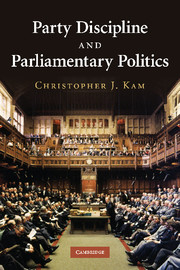Book contents
- Frontmatter
- Contents
- List of figures
- List of tables
- Acknowledgements
- 1 Introduction
- 2 A model of intra-party politics
- 3 Patterns of backbench dissent in four Westminster parliamentary systems, 1945–2005
- 4 Policy preferences and backbench dissent in Great Britain and Canada
- 5 Dissent, constituency service, and the personal vote in Great Britain and New Zealand
- 6 The cost of dissent to the party
- 7 Demotion and dissent in the Canadian Liberal Party, 1991–1997
- 8 Discipline and dissent in the Australian Coalition, 1996–1998
- 9 Career trajectories, socialization, and backbench dissent in the British House of Commons
- 10 Conclusion
- Appendix 1 Comparative statics and proofs
- Appendix 2 Content and construction of ideological scales
- Appendix 3 Sampling and coding of media dissent and discipline
- Appendix 4 Demotion and the parliamentary careers of Canadian MPs
- References
- Index
9 - Career trajectories, socialization, and backbench dissent in the British House of Commons
Published online by Cambridge University Press: 03 July 2009
- Frontmatter
- Contents
- List of figures
- List of tables
- Acknowledgements
- 1 Introduction
- 2 A model of intra-party politics
- 3 Patterns of backbench dissent in four Westminster parliamentary systems, 1945–2005
- 4 Policy preferences and backbench dissent in Great Britain and Canada
- 5 Dissent, constituency service, and the personal vote in Great Britain and New Zealand
- 6 The cost of dissent to the party
- 7 Demotion and dissent in the Canadian Liberal Party, 1991–1997
- 8 Discipline and dissent in the Australian Coalition, 1996–1998
- 9 Career trajectories, socialization, and backbench dissent in the British House of Commons
- 10 Conclusion
- Appendix 1 Comparative statics and proofs
- Appendix 2 Content and construction of ideological scales
- Appendix 3 Sampling and coding of media dissent and discipline
- Appendix 4 Demotion and the parliamentary careers of Canadian MPs
- References
- Index
Summary
Introduction
There is much truth to Enoch Powell's maxim that all political lives end in failure. Indeed, the vast majority of MPs never attain a cabinet position. Even the lucky few who do stand a good chance of finishing their careers on the back bench, their time as ministers cut short by reshuffles, leadership changes, or simply age. This points to an inherent end-game problem with relying solely on advancement to maintain unity: all MPs realize that there comes a point where advancement is no longer forthcoming and once this point is reached, leaders must find other ways to elicit their MPs' loyalty. Discipline is an option, of course, but as the results of the previous chapter indicate, it is at most a stopgap measure. Certainly, those who take a sociological view of parliamentary politics argue that party leaders deal with these conditions instead by cultivating among their members a voluntary commitment to norms of loyalty and unity (e.g., Kornberg 1967, p. 134; Crowe 1986, p. 180; Jackson 1987, p. 55; Searing 1994). Thus over time MPs come to feel a sense of duty to the party and to internalize the costs of engaging in undesirable behaviour. In this chapter, I use data on British MPs' parliamentary careers and voting records to demonstrate in a quantitative fashion that socialization into norms of party loyalty limits MPs' propensity to dissent once their careers begin to decline.
- Type
- Chapter
- Information
- Party Discipline and Parliamentary Politics , pp. 189 - 204Publisher: Cambridge University PressPrint publication year: 2009



